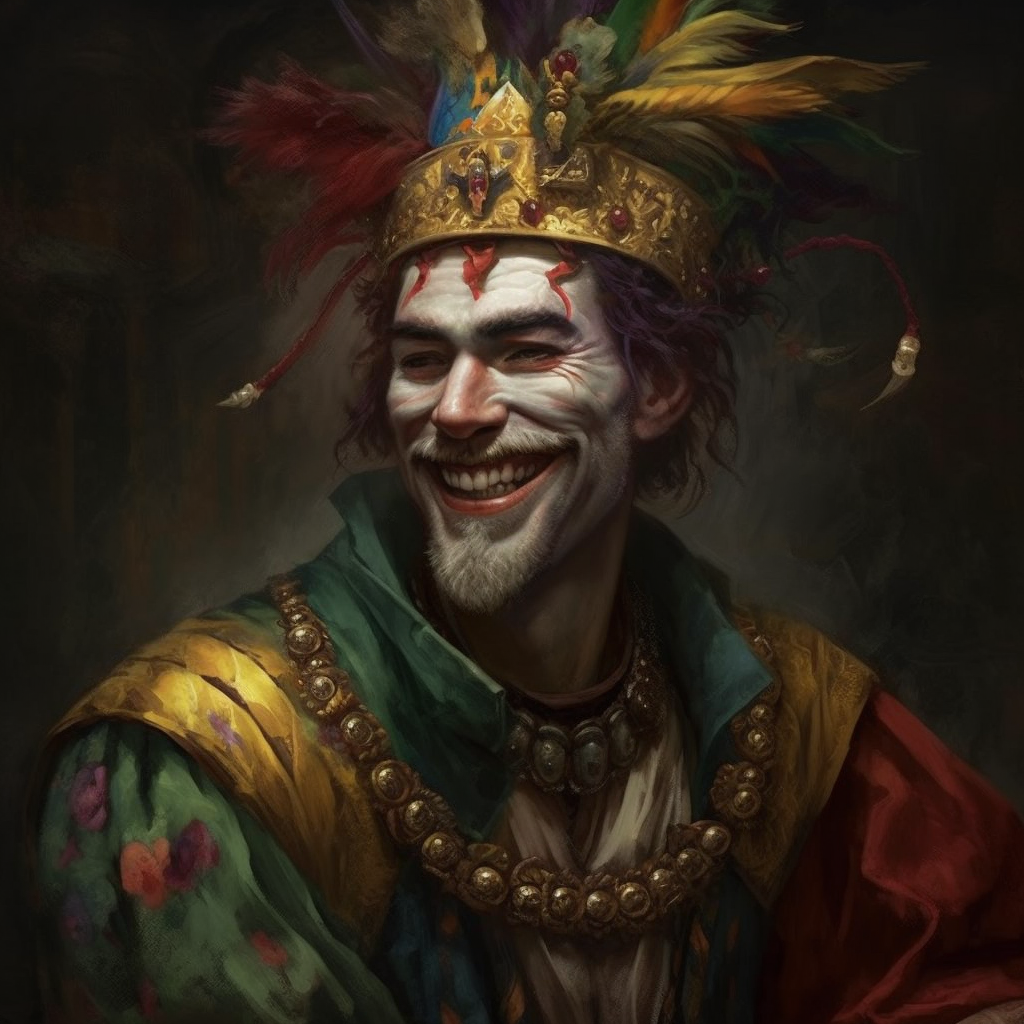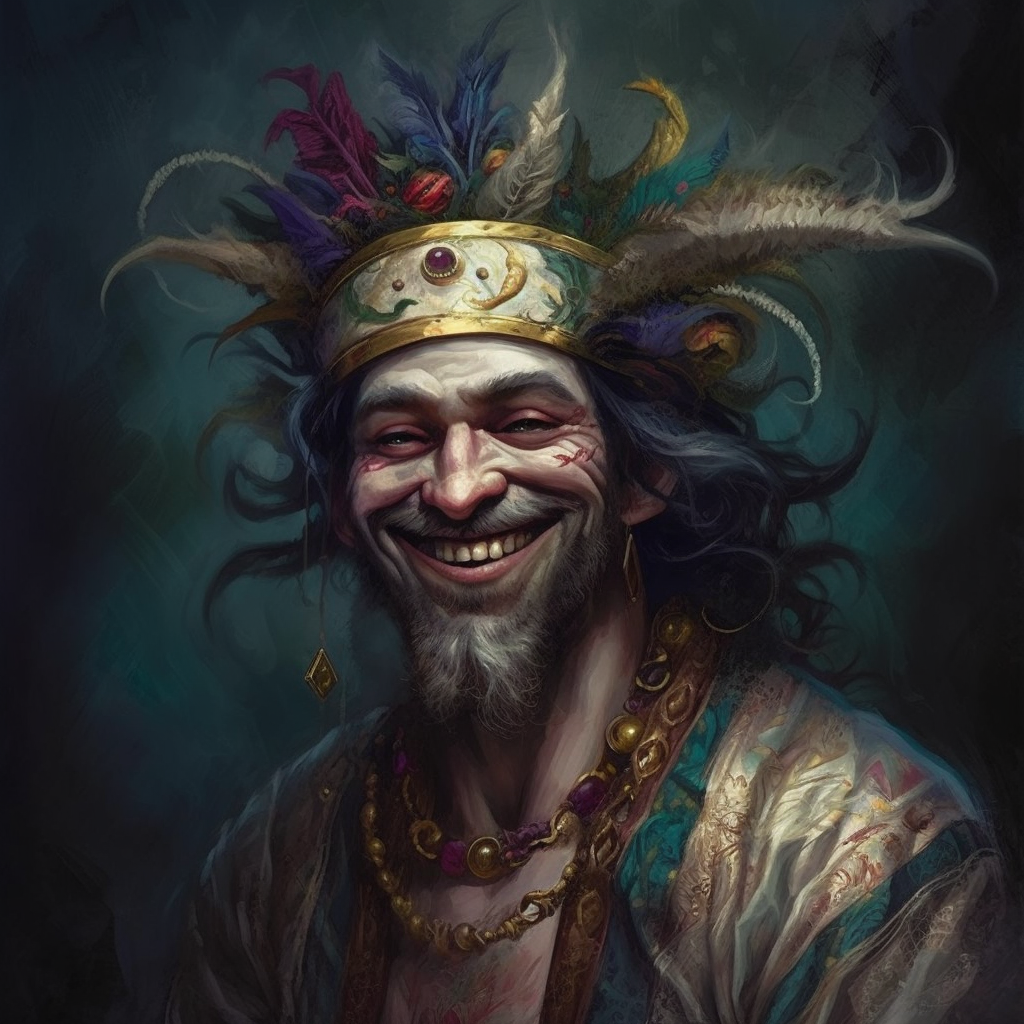Momus, God of Satire, Mockery, and Criticism
Momus was the Greek god of satire, mockery, and criticism.

- Pantheon: Greek Pantheon
- Deity Title: Momus, God of Satire, Mockery, and Criticism
- Deity Symbol: A mask of comedy or tragedy, a quill pen, or a tongue with a sharp point
- Home Plane: Olympus
- Deity Level: Lesser Deity
- Alignment: Chaotic Neutral
- Aliases: Momos, Momo, The Blamer, The Faultfinder
- Superior: Zeus
- Traditional Allies: Athena, Apollo, Hermes
- Traditional Foes: Hera, Aphrodite, Ares
- Divine Artifact: Wand of the Jester’s Head.
- Servants: The Muses, Nymphs of Satire and Mockery
- Servitor Creatures: Imps, Satyrs
- Sacred Animal: Donkey
- Manifestations: A disembodied voice that mocks and criticizes, a gust of wind that blows things out of place, a sudden appearance of a donkey, a sudden transformation of someone’s appearance to make them appear ridiculous.
- Signs of Favor: A sudden burst of inspiration for satire or comedy, protection from criticism, the sudden disappearance of an enemy.
- Worshipers: Poets, writers, comedians, critics, satirists, artists, anyone who values humor and criticism.
- Cleric Alignments: Chaotic Neutral, Chaotic Good, Neutral
- Specialty Priests: Faultfinders, Jesters, Satirists
- Holy Days: The Feast of Fools (January 1st), The Day of Mockery (April 1st)
- Portfolio: Satire, Mockery, Criticism, Humor
- Domains: Chaos, Trickery, Knowledge
- Favored Weapon: Whip
- Favored Class: Bard
- Favored Race: Halflings
- Duties of the Priesthood: To spread humor and criticism, to mock the powerful, to inspire creativity and originality.
- Major Cult/Temple Sites: The Temple of Momus in Athens, Greece
- Benefits: Followers of Momus gain the ability to see flaws and imperfections in people and objects, immunity to being mocked or criticized, and the ability to inspire laughter and mirth.
Momus is the Greek god of satire, mockery, and criticism, known for his sharp tongue and quick wit. He is often portrayed as a mischievous and cunning figure, always looking for ways to poke fun at the gods and mortals alike. Despite his reputation for being a troublemaker, Momus is also a keen observer of human nature and uses his sarcasm to expose hypocrisy and challenge authority.
Born to the goddess Nyx and the god Erebus, Momus was one of the earliest gods to emerge from the primordial chaos. From a young age, he displayed a talent for making people laugh with his clever jokes and biting commentary. As he grew older, he became increasingly critical of the established order, seeing the flaws and weaknesses in even the most powerful of gods.
Momus is not content to simply mock and ridicule, however. He sees himself as a voice of truth and justice, using his wit to hold those in power accountable and challenge their assumptions. He believes that by exposing the faults and follies of the gods, he can help make the world a better place for mortals and immortals alike.
Momus is a tall, slender figure with sharp features and a mischievous expression. He has wavy, shoulder-length hair that falls around his face and a well-groomed beard. He wears a toga that drapes over his lean frame, and carries a wand with a jester’s head on top. His eyes are bright and quick, constantly darting around as he observes the world with a critical eye.
Despite his good intentions, Momus’s relentless criticism has made him many enemies among the gods. He has been banished from Olympus on multiple occasions and has a reputation for being difficult to work with. However, he remains undaunted in his quest to hold the powerful to account and is always on the lookout for new targets to skewer with his sharp tongue.
Momus, Greek god of satire, mockery, and criticism.

CR: 30
Armor Class: 35 (Divine Armor)
Hit Points: 800 (40d20+400)
Speed: 60 ft., fly 120 ft.
| STR | DEX | CON | INT | WIS | CHA | |
|---|---|---|---|---|---|---|
| Score | 30 | 30 | 30 | 30 | 30 | 30 |
| Mod | +10 | +10 | +10 | +10 | +10 | +10 |
Skills: Insight +30, Intimidation +30, Persuasion +30
Senses: truesight 120 ft., passive Perception 40
Languages: all
Legendary Resistance (3/Day): If he fails a saving throw, he can choose to succeed instead.
Divine Power: He can cast any spell from the domains of Trickery, Knowledge, and War without expending spell slots.
Divine Artifacts: Momus possesses the Mirror of Truth, an artifact that can reveal the true nature of any person or object, as well as the Staff of Satire, which can inflict damage and curse its targets with ridicule.
Actions:
Multiattack: He can make three melee attacks or use three different divine spells.
- Jester’s Strike: Melee Weapon Attack: +12 to hit, reach 5 ft., one target. Hit: 22 (4d8 + 4) bludgeoning damage and the target must succeed on a Wisdom saving throw (DC 18) or be affected by the Tasha’s Hideous Laughter spell for one minute.
- Cursed Laughter: The jester cackles maniacally, forcing all creatures within a 30-foot radius to make a Wisdom saving throw (DC 18) or become incapacitated with laughter for one round.
- Divine Spells: Momus can cast any spell from the domains of Chaos, Trickery and Knowledge.
Legendary Actions (3/turn):
Momus can take 3 legendary actions, choosing from the options below. Only one legendary action option can be used at a time and only at the end of another creature’s turn. Momus regains spent legendary actions at the start of his turn.
- Mockery: He targets a creature within 120 ft. with a cutting remark, forcing the creature to make a Wisdom saving throw (DC 30) or become disoriented, losing its next action.
- Divine Inspiration: He bestows a flash of insight on a creature within 120 ft., granting the creature advantage on its next skill or ability check.
- Truthsayer: Momus reveals a deep truth about a creature or object within 120 ft., causing it to become stunned for one round. The creature can repeat the saving throw at the end of its turn.
Lair Actions:
On initiative count 20 (losing initiative ties), Momus can take a lair action to cause one of the following magical effects; Momus can’t use the same effect two rounds in a row:
- All creatures in the lair must succeed on a Wisdom saving throw (DC 30) or be forced to speak the truth for the next minute.
- The area around Momus becomes shrouded in illusion, creating the effect of the Mirage Arcana spell within a 120 ft. radius.
- Momus’ mocking laughter echoes through the lair, causing all creatures within 120 ft. to become frightened for one minute unless they succeed on a Wisdom saving throw (DC 30).
Regional Effects:
The region where Momus lairs is warped by his divine power, creating the following effects:
- All creatures within the region must make a Wisdom saving throw (DC 30) or suffer disadvantage on all Charisma-based checks.
- The landscape is twisted and distorted, creating visual illusions that cause creatures to become disoriented and lose their sense of direction.
- Creatures within the region who attempt to deceive or lie suffer disadvantage on all rolls to do so.
Overall, Momus is a powerful and challenging foe for any adventurers who dare to face him. With his high stats and powerful Divine Power, he is capable of casting a wide range of spells from his chosen domains. His Divine Strike is particularly devastating, dealing a massive amount of radiant damage with each hit.
In addition to his combat abilities, he also possesses powerful lair and legendary actions that can disrupt and disorient his enemies. The Wand of the Jester’s Head add an extra layer of danger to any battle with Momus, as they can reveal the true nature of his foes and curse them with ridicule. All in all, Momus is a formidable deity who will test the mettle of even the most experienced adventurers.
Divine Artifact: Wand of the Jester’s Head
Description: This wand is adorned with a jester’s head made of silver, with a cap of rainbow-colored gems. When activated, the jester’s eyes light up, and a high-pitched cackle emanates from the wand.
Abilities:
- Spellcasting: The wand can be used to cast the following spells: Tasha’s Hideous Laughter, Vicious Mockery, and Crown of Madness. Each spell can be cast once per day.
- Cursed Jester: Once per day, the wielder of the wand can summon a cursed jester to do their bidding. The jester has the following stats:
- Armor Class: 20
- Hit Points: 200
- Speed: 40 ft.
- STR 18 (+4), DEX 18 (+4), CON 18 (+4), INT 8 (-1), WIS 10 (+0), CHA 20 (+5)
- Skills: Acrobatics +12, Performance +15, Persuasion +15
- Senses: Darkvision 60 ft., passive Perception 10
- Languages: Common, Sylvan
- Actions:
- Jester’s Strike: Melee Weapon Attack: +12 to hit, reach 5 ft., one target. Hit: 22 (4d8 + 4) bludgeoning damage and the target must succeed on a Wisdom saving throw (DC 18) or be affected by the Tasha’s Hideous Laughter spell for one minute.
- Cursed Laughter: The jester cackles maniacally, forcing all creatures within a 30-foot radius to make a Wisdom saving throw (DC 18) or become incapacitated with laughter for one round.
- Trickster’s Blessing: Once per day, the wand can be used to grant the wielder the effects of the Bless spell for one hour.
- Curse of the Jester: Once per day, the wielder of the wand can curse a creature within 60 feet. The cursed creature must succeed on a Wisdom saving throw (DC 18) or become afflicted by the Crown of Madness spell for one minute.
Note: The above stats are for a powerful artifact, and should be adjusted for balance in your game.
Currently in the World
Momus, the Greek god of satire, mockery, and criticism, finds himself in the midst of the Renaissance, observing the rapid advancements in art, science, and technology. As the printing press has just been invented by Johannes Gutenberg, and the written word is now more accessible than ever, he sees an opportunity to spread his influence and sow the seeds of discontent among the people.
He begins to take note of the works of a young playwright named William Shakespeare, who is gaining popularity in England with his witty and irreverent plays. He sees in Shakespeare a kindred spirit, a man who understands the power of satire and the importance of questioning authority.
As Shakespeare’s plays gain more and more attention, Momus begins to influence their content, subtly nudging the playwright towards more biting commentary on the societal norms of the day. He also takes advantage of the printing press, encouraging the dissemination of pamphlets and other written works that challenge the status quo.
As he works to subvert the established order, he also keeps a watchful eye on the political landscape of Europe. He sees the rise of powerful monarchs like Henry VII of England and Charles VIII of France, and worries that their unchecked power will lead to oppression and suffering for the people.
In an effort to counter this, he works behind the scenes, whispering in the ears of influential figures and advocating for a more democratic system of government. He knows that change will not come easily, but he is willing to play the long game in order to achieve his goals.
As the 1450s draw to a close, Momus remains a shadowy figure, pulling the strings of those in power and working to shape the course of history. He knows that his influence will be felt for centuries to come, and he is content to bide his time, waiting for the right moment to strike and push humanity towards a brighter future.

 Buy me a coffee
Buy me a coffee